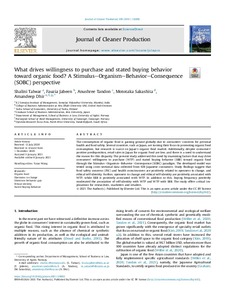What drives willingness to purchase and stated buying behavior toward organic food? A Stimulus–Organism–Behavior–Consequence (SOBC) perspective
Talwar Shalini; Jabeen Fauzia; Tandon Anushree; Sakashita Mototaka; Dhir Amandeep
https://urn.fi/URN:NBN:fi-fe2021042825564
Tiivistelmä
The consumption of organic food is gaining ground globally due to consumers’ concerns for personal health and food safety. Several countries, such as Japan, are turning their focus to promoting organic food consumption, but research is scarce on Japan’s organic food market. Additionally, despite consumers’ positive predisposition, retail sales in Japan for organic food are low, and there is a need to understand the reason for this disparity. The present study addressed this need by examining factors that may drive consumers’ willingness to purchase (WTP) and stated buying behavior (SBB) toward organic food through the Stimulus–Organism–Behavior–Consequence (SOBC) paradigm. The developed model was tested using cross-sectional data collected from 928 Japanese consumers. Study findings suggest that food safety concerns (FSC) and health consciousness are positively related to openness to change, and ethical self-identity. Further, openness to change and ethical self-identity are positively associated with WTP, while SBB is positively associated with WTP. In addition to this, buying frequency positively moderated the association of self-identity with WTP and WTP with SBB. The study offers critical implications for researchers, marketers and retailers.
Kokoelmat
- Rinnakkaistallenteet [29335]
